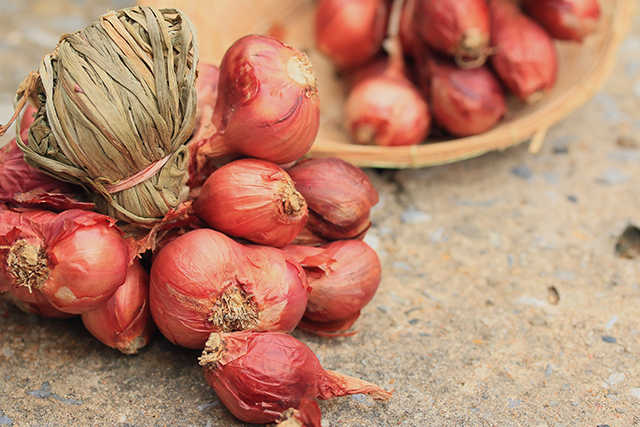
Advertisement
If you’re in the market for a tasty herb that’s packed with health-supporting nutrients, the shallot may be what you’re looking for.
Native to the mountains of central Asia and the Middle East, the shallot – known to the scientific community as Allium cepa var. aggregatum – was a staple food in ancient Egypt and was even considered by the ancient Persians as a sacred, healing plant.
Known for their sweet and subtle herb-y flavor, shallots were used extensively by the Romans, not just as food, but also as a remedy for gastrointestinal issues and tumors and even infections. Such was its popularity that the famed Roman naturalist Pliny the Elder even mentioned the shallot in his 77 CE encyclopedia Naturalis Historia.
Sometime after the end of the Crusades, shallots found their way to the rest of Europe, and by 1554, were grown extensively in Spain, Italy, France and Germany. By 1806, shallots became established in the United States.
In the kitchen, shallots are predominantly used in a similar fashion to regular onions, that is, they are usually sauteed, fried, added to salads and vinaigrettes and added to stews.
Recent research, however, shows that the shallot may be hiding more than just flavor in its nutrient-packed sleeve.
What health benefits can I get from shallots?
Shallots, as noted by experts, are particularly rich in nutrients such as minerals, vitamins and trace elements. Among the important minerals packed into the bulbs and cloves of this wonderful herb are phosphorus, potassium, magnesium, manganese, iron and copper.
Not only that, but shallots are also rich in vitamin B6 which plays an important role in the functioning of the nervous and immune systems, as well as vitamin B9 or folic acid which is essential to bodily processes such as cell division, DNA synthesis and red blood cell formation. In addition, shallots also have rich stores of vitamin C and vitamin A, two major vitamins that have been linked to multiple health benefits.
Shallots are also an excellent source of selenium, a trace element that protects cells against aging and contributes to healthy skin and hair. Its benefits aren’t just skin deep, however: when combined with vitamin E — which is also found in shallots — selenium also contributes to the formation of important antibodies that defend the body against external pathogens.
Being nutrient-dense herbs, shallots have been linked to an impressive array of health benefits.
1. Shallots may help prevent oxidative damage
Aside from containing vitamins and minerals, shallots are also known for having high levels of antioxidant compounds such as kaempferol, quercetin and various other health-supporting sulfuric compounds.
In fact, research has shown that shallots contain the highest amounts of antioxidants among the 11 common varieties of onions.
According to studies, these antioxidants are released when the shallots’ bulbs are sliced or crushed, similar to garlic. As soon as these antioxidants are released, they bind with each other to form another compound called allicin.
As detailed in several papers, this powerful compound can help reduce the effect that oxidative damage – a destructive process caused by free radicals from the environment – has on cells.
2. Shallots may help relieve allergy symptoms
During an allergic reaction, cells in your body release histamine, which triggers symptoms such as tissue swelling, watery eyes and mild to severe itchiness.
As it turns out, shallots are high in quercetin, a compound that can help reduce and manage symptoms related to seasonal allergies. According to a paper published in the journal Pharmacognosy Review, this is because quercetin prevents the release of histamine and also lessens the severity of several allergic reactions such as inflammation, allergic asthma and bronchitis.
In fact, quercetin is used as the primary ingredient in many seasonal allergy remedies, as well as supplements used to manage mild allergy symptoms that affect both the eyes and nose.
3. Shallots can help combat harmful pathogens
According to research, vegetables and herbs from the Allium family, such as shallots, onions and garlic, have antibacterial, antifungal, and antiviral properties. It is because of this that shallots and other alliums have long been used in traditional medicine as a treatment for colds, fevers, and coughs and even the flu.
In one study, 62.5 percent of participants with seasonal allergies saw a reduction in their symptoms after taking 200 mcg/mL of shallot extract daily, compared to 37.5 percent in the control group.
Meanwhile, another found that Allium plants are effective at treating various fungal infections, including Candida. This means that if you want to fight candida the natural way, then superfoods such as shallots may be all that you need.
Shallots are also effective at treating cold sores or oral herpes. This is according to a study that found that those who applied a 0.5 percent shallot extract solution hourly to new cold sores significantly reduced their duration, with the sores clearing up within six hours.
4. Shallots may support good cardiovascular function
Just like all vegetables and herbs in the Allium family, shallots may benefit heart health and blood circulation due to their nature as nutrient and phytochemical powerhouses.
According to experts, shallots contain high amounts of thiosulfinates, an organosulfur compound that, in conjunction with quercetin, may help prevent the formation of dangerous blood clots.
Meanwhile, allicin, another organosulfur compound in shallots, has been shown to reduce the stiffness of blood vessels by releasing a compound called nitric oxide, which, according to research, can help improve circulation by lowering one’s blood pressure.
In addition, shallots may also help reduce the levels of harmful fats that can build up in the blood. Research has shown that women with type 2 diabetes who ate shallots with yogurt experienced a reduction in their total cholesterol, low-density lipoprotein (bad cholesterol) and triglyceride levels, compared to women who ate yogurt by itself.
5. Shallots may help reduce one’s feelings of stress
If you’re feeling down and out, shallots may be of help.
This is because shallots contain ample amounts of pyridoxine or vitamin B6. Pyridoxine, according to medical experts, can help encourage the production of gamma-aminobutyric acid or GABA, which is important for maintaining lowered stress levels and keeping the hormones in the body at the appropriate levels.
This means that if you wish to reduce stress or relax your mind, eating food with shallots can give you a quick GABA boost. Not only that, folic acid – another essential B-vitamin that helps promote optimal cognitive function by regulating hormonal and enzymatic reactions in the brain – is also found in significant quantities in shallots.
How can I add shallots to my diet?
Raw shallots are milder than onions when it comes to pungency and taste. This means they are best added to dishes that call for more delicate flavors such as summer salads, relishes and sandwiches.
However, as they still have a similar flavor profile as onions when cooked, shallots can be readily swapped out for the former in a pinch – just remember to keep the ratios correct, as shallots are generally much smaller than regular onions.
A good rule of thumb is to use three shallots for every onion called for in a recipe.
Some popular ways to prepare shallots include the following:
- Oven-roasting whole shallot cloves and serving them with a dipping sauce
- Skewered and grilled with other organic vegetables and paired with meat or tofu
- Chopped finely and added to tartar sauce
- Minced then fried to a crisp and sprinkled on top of stews
- Glazed with some organic honey then baked and served as a side dish
- Caramelized and used as a topping for pulled pork sandwiches
- Finely diced and sprinkled on vegetable salads
- Sprinkled on top of a pizza as a substitute for onions
- Pickled and served alongside organic shrimp and shellfish as part of a seafood cocktail
Interested in adding more shallots into your diet? Here are three easy recipes that you can try:
Quick Pickled Shallots
Want to add a quick jolt of acidity and crunch to your sandwiches and salads? This easy recipe is perfect for you.
PS: We used shallots in this recipe but you can use other vegetables to your liking – it’s that versatile.
PPS: As the shallots are only “quick pickled” you must store the finished product in the fridge in order to stave off possible spoilage.
Ingredients:
- ½ cup organic rice vinegar
- 1 tablespoon raw brown sugar OR organic Manuka honey OR organic maple syrup
- 2 teaspoons kosher salt OR pink Himalayan salt
- 1 teaspoon whole organic peppercorns
- 1 cup thinly sliced organic shallots
- Optional: 1 organic bird’s eye chili for heat
Directions:
- Whisk the vinegar, sugar, and salt in a small bowl until the sugar and salt are dissolved.
- Add shallots and spices and let sit for 10 minutes. Remember to squeeze the shallots gently with your hands occasionally to help them pickle more quickly.
- Pack into sterilized glass jars and store in the refrigerator.
PS: Planning to bring these to a potluck? Don’t worry — the shallots can be pickled and refrigerated up to three days ahead.
Easy Organic Shallot Vinaigrette
Meant to showcase the delicate and subtle flavor of shallots, this vinaigrette is the perfect partner for any green salad.
As versatile as its main flavoring ingredient, this dressing can also be brushed on top of roasted vegetables, and even used as a marinade for any type of protein, whether it’s poultry, meat, fish or any vegan substitute.
Ingredients:
- ¼ cup finely minced organic shallots
- 2 tablespoons red wine vinegar
- 1 tablespoon organic Dijon mustard
- 1 tablespoon organic Manuka honey OR organic maple syrup
- 1/4 cup organic extra-virgin olive oil
- Pink Himalayan salt, to taste
- Freshly ground organic black pepper, to taste
- ½ teaspoon chopped fresh herbs of your choosing (basil, oregano or rosemary will work well)
Directions:
- In a small bowl, whisk together the minced shallots, vinegar, mustard, and honey or maple syrup.
- Slowly whisk in the olive oil until the mixture is well-combined.
- Season with salt and pepper. Adjust seasoning to taste.
- Stir in the chopped herbs, if desired.
- Transfer mixture into a jar or bottle. Keep refrigerated.
Another superfood that’s been quietly hiding in plain sight in our kitchens and pantries, shallots not only have an extensive and colorful history, they also have an incredibly impressive armada of health benefits — all thanks to its range of potent phytonutrients.
Delicious, versatile and most importantly, overflowing with immune-supporting vitamins and other nutrients and minerals, shallots — and other vegetables in the Allium family, for that matter — might just become your new favorite veg.
Sources include:
Advertisements







